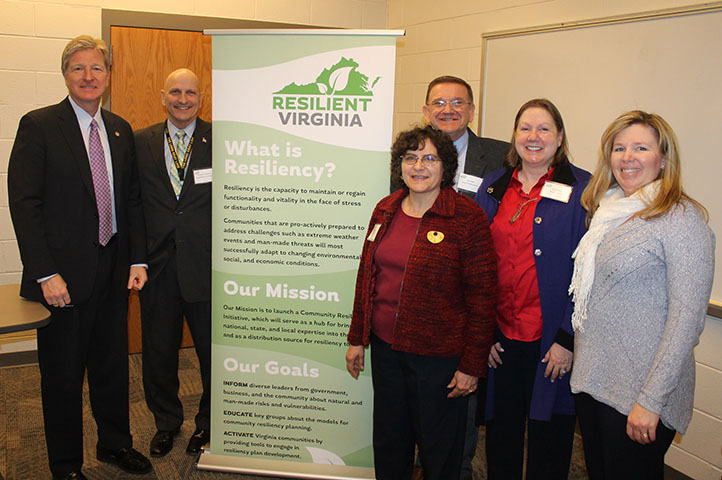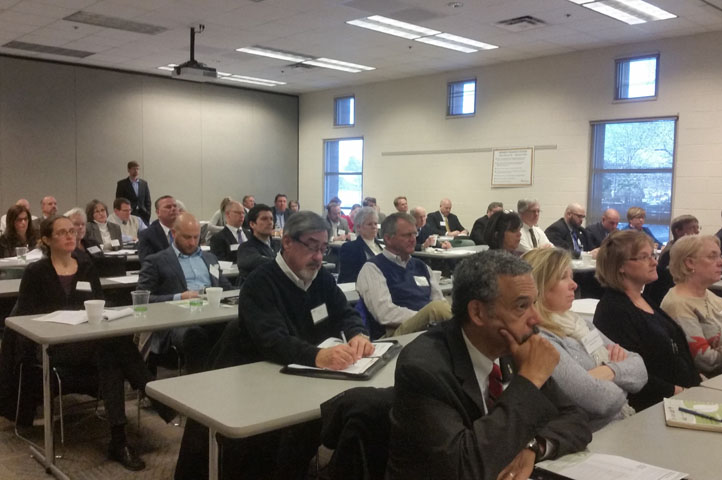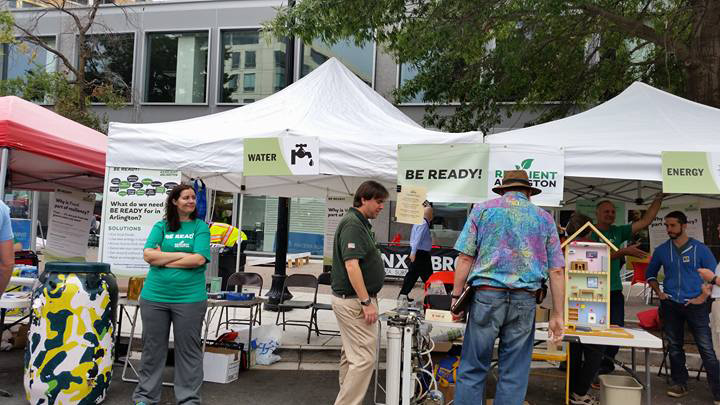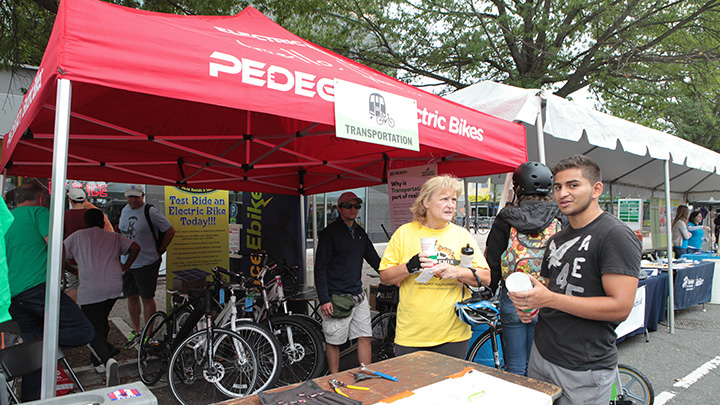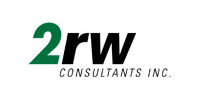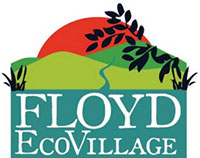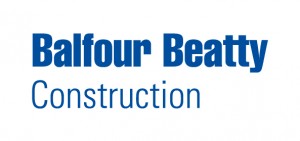Resilient Virginia’s First Year Accomplishments and Future Action Priorities
Resilient Virginia is celebrating its “one year and counting” anniversary. We have started down the path of meeting our strategic goals and are pleased to provide you with an update of our progress. Resilient Virginia was created to accelerate resiliency planning in communities around the state through three major goals.
Goal 1 : INFORM
Resilient Virginia has created a website, Facebook, and Twitter presence to inform viewers around the state and region.
- Our website — www.resilientvirginia.org — will continue to expand the number and types of informational resources addressing a wide range of resiliency topics. These include energy options, high-performance buildings, food and water security, emergency preparedness, business-related risk management, and public policy.
- Our calendar — www.resilientvirginia.org/calendar — includes events related to a wide range of resiliency activities happening around the state and region. Send your event notices to osso@resilientvirginia.org. Thanks to our volunteer, Barbara Swart, for keeping the calendar up to date.
- Our Facebook and Twitter sites feature current articles and news from around the region, the nation, and the world. Like us on Facebook, follow us on Twitter.
Goal 2: EDUCATE
To enhance our goal of creating educational and program activities, we have assembled a Planning Committee with diverse geographic and interest area representation. We are intent on engaging a wide range of interests ranging from the top state officials to regional organizations, businesses, and local governments and community groups.
Our outreach has included engagement with:
- Secretary of Public Safety and Homeland Security Brian Moran and Deputy Secretary Adam Thiel, as well as Deputy Secretaries Evan Feinman (formerly with Natural Resources) and Hayes Frame (Commerce and Trade).
- State agency directors and staff of the Department of Environmental Quality; Department of Mines, Minerals and Energy; Department of Agriculture and Consumer Affairs; and Department of Emergency Management.
- Appointees for the Governor’s Climate Change and Resiliency Update Commission.
- Major Virginia university programs involved with resiliency and sustainability, including departments at Old Dominion University, George Mason University, Virginia Commonwealth University, Virginia Tech, University of Virginia, and James Madison University.
- An alliance with the Virginia Municipal League and Virginia Association of Counties.
Resilient Virginia carried out a highly successful Community Resiliency Initiative Launch event in February 2015 featuring Secretary Moran, local government speakers, and speakers from the Urban Land Institute, National League of Cities, and the USDA Southeastern Climate Research Hub. View their presentations at here.
Upcoming Priority — The First Resilient Virginia Conference
The Resilient Virginia Conference, now scheduled for March of 2016, is being created to:
- inform community members, business leaders, and state and local officials about resiliency concepts;
- provide outstanding examples of communities moving toward resiliency in Virginia, the nation, and internationally; and
- carry out participatory sessions to bring together key stakeholders by regions to explore resilient community goals and strategies.
You can participate in planning sessions on resiliency building in urban, agricultural, and coastal communities or by supporting the conference. Contact Annette Osso at osso@resilientvirginia.org. View the Sponsor Information here.
Goal 3: ACTIVATE
Resilient Virginia has moved ahead with its goal of activating local public and private community members to work on resiliency plans. We have participated in a variety of resiliency-building events, including:
- Having our first exhibit booth at the November 2014 Roanoke Green Living and Energy Expo (www.aecpes.org);
- Being active participants in the FEMA Hampton Roads Climate Adaptation, Preparedness, and Resilience Exercise, hosted by the Old Dominion University Center for Sea Level Rise (centerforsealevelrise.org);
- Being members and active participants in the Urban Land Institute-Hampton Roads Regional Sea Level Rise Collaborative. They have held two Resilient Region Reality Check public events, with more to be planned (http://hamptonroads.uli.org/);
- Participating in a seminar on Enhancing Community and Infrastructure by Ecosystem Restoration, organized by Ecology and Environment Inc. (ene.com);
- Creating the local project — Resilient Arlington — a lively collaboration with local community organizations and businesses, along with the participation of the Arlington County Office of Emergency Management. View our first community event — BE READY! Resilient Arlington — held September 26, 2015 on Facebook. See the photo album here; and
- Expanding the ability to reach additional audiences through our inclusion in several proposals to federal agencies, including NOAA, NSF, and HUD.
Upcoming Priority: Resiliency Checklists
An early alliance with the Virginia Municipal League and Virginia Association of Counties led to our participation in their initial efforts to include resiliency criteria in their Go Green Virginia Challenge (www.gogreenva.org). We will engage their constituents — and work with other partners — to further develop resiliency guidelines for local governments and the general public.
Some Special Mentions
Hats off to our 2014–2015 Board of Directors!
Resilient Virginia Chairman
Energy Manager
County of Henrico
wal03@co.henrico.va.us
Bryna Dunn, AICP, Associate AIA,
LEED Fellow
Resilient Virginia Vice Chairman
Moseley Architects
bdunn@moseleyarchitects.com
Nell Boyle, LEED AP
Sustainability and Outreach Coordinator
City of Roanoke
Nell.boyle@roanokeva.gov
McGuire Woods
dslone@mcguirewoods.com
Erin Stanforth
Director of Sustainability
Virginia Commonwealth University
eestanforth@vcu.edu
Denise Thompson
Manager, Environmental Protection Programs
City of Norfolk
Denise.thompson@norfolk.gov
Pamela Vosburgh
2rw Consultants, Inc
Plvosburgh@yahoo.com
A resounding “Thank You” to our first year supporters!
And To Our Members — Many thanks!
Join our growing list of supporters, members, and partners. Visit www.resilientvirginia.org/support-us. Support Resilient Virginia today — it’s our future!
Help spread the word about resiliency — like us on Facebook and follow us on Twitter!

